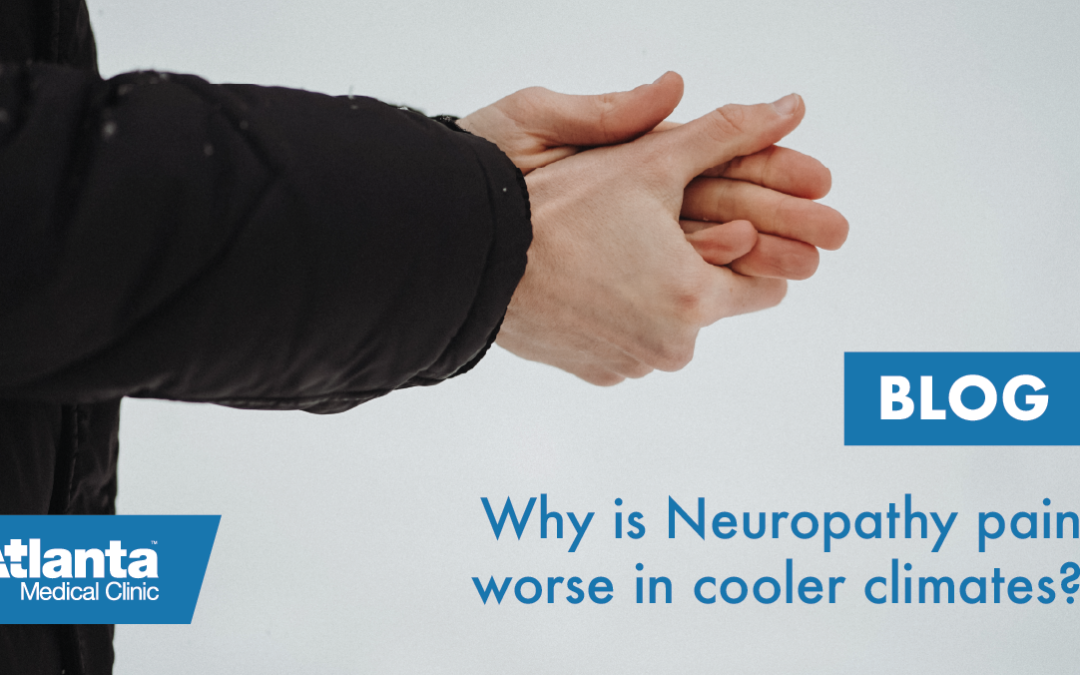If you suffer from neuropathy, then you’re probably familiar with the plethora of aches, pains and pins-and-needles that come with it. Unfortunately, you’re probably even more familiar if you live in a cooler climate. Like most chronic pain, neuropathy tends to worsen as temperatures drop, but why? Learn how the cool climate affects your pain levels and how to beat it so you can feel relief once and for all.
What is Neuropathy?
Neuropathy, also referred to as peripheral neuropathy, polyneuropathy, or nerve pain is a condition in which one experiences progressive numbness, tingling, muscle weakness and pain in the feet and/or hands. Neuropathy is caused by damaged nerves in the peripheral nervous system and can be attributed to various factors, including environmental toxins, trauma, illness, or infection. The most common causes of neuropathy include:
Diabetes
Alcoholism
Poor nutrition
Vitamin deficiency
Certain medications
Kidney or thyroid disease
Neuropathy Pain and Cold Climates
As with all chronic pain, neuropathy pain tends to increase when cool weather approaches. This can happen for several reasons:
Decreased Blood Flow:
When exposed to colder temperatures, blood circulation in the hands and feet begins to slow to preserve a warmer temperature at the body’s core. As blood flow decreases, neuropathy pain increases.
Decreased Barometric Pressure:
The drop in barometric pressure increases pressure on the nerves that send pain signals to the brain. This pressure causes the nerve signals to slow down, thus increasing pain perception.
Tight Muscles:
Colder temperatures cause muscles to tighten and spasm and can lead to the soft tissue surrounding joints expanding, creating a restriction and resulting in increased pain.
How to Manage Neuropathy Pain in Cold Climates
You may not be able to avoid your neuropathy pain altogether, but there are multiple ways to aid in relief during the cool months.
Bundle Up:
Staying warm in cold weather is an effective way to reduce neuropathy pain. So, when it’s time to head outside, be sure you’re well-equipped to prevent heat from escaping your body. A warm coat, hat, scarf, gloves and socks will aid in healthy blood flow and keep you warmer longer.
Skip the Stimulants:
Popular stimulants such as coffee and tea can cause blood vessels to narrow, consequently restricting blood flow and increasing pain. In addition to caffeine, other stimulants such as nicotine found in cigarettes have been known to increase neuropathy pain due to decreased blood flow.
Move Your Body:
Light cardio and low-impact exercises such as walking, restorative yoga, swimming and weight training can help warm up the muscles and promote circulation, warding off the neuropathy pain often associated with colder temperatures.
Feel Better with Atlanta Medical Clinic
Neuropathy pain can be managed effectively with the right help. Our team at Atlanta Medical Clinic is here to help you live pain-free. Our groundbreaking treatment protocol helps relieve the symptoms of neuropathy and works to restore the function of damaged nerves so you can experience long-lasting relief. Contact us to schedule your free consultation and get one step closer to neuropathy pain relief today!


Nothing not even strong opiates help my pain in feet ankles and hands. EMG showed no peripheral Neuropathy but I hear Small Fiber and Neuropathy can only be diagnosed to a skin biopsy I also hear it is more painful than other neuropathies I feel like my life it’s over
Hi Mary. We are very sorry to hear that. Please don’t hesitate and call us at 404-872-8837. We will try our best to help you with your pain.
Barometric Pressure is increasing in winter.